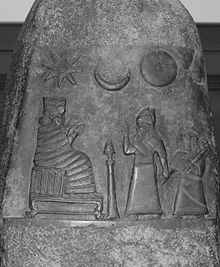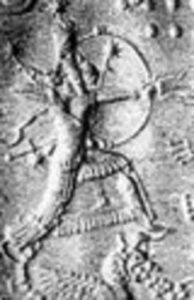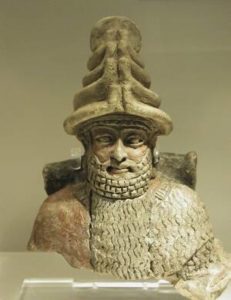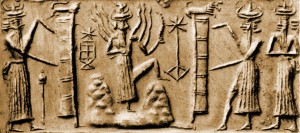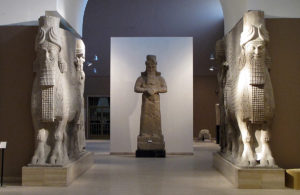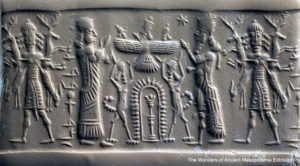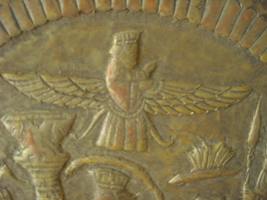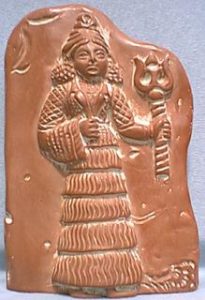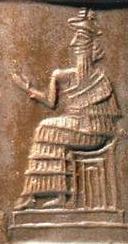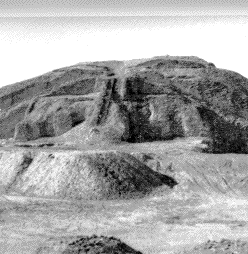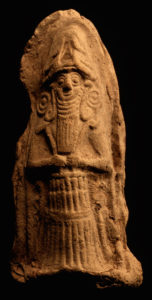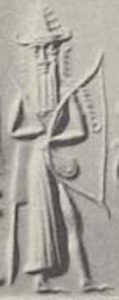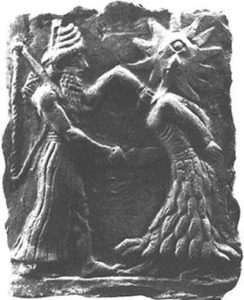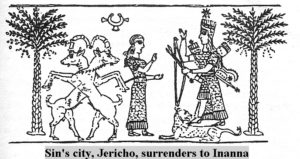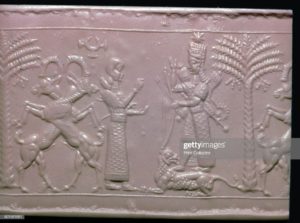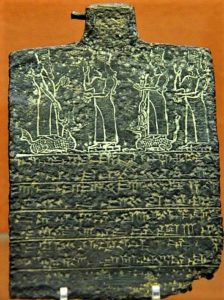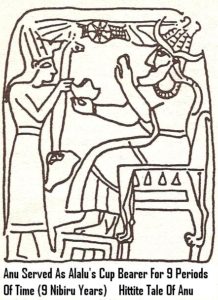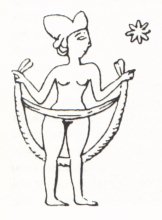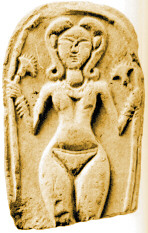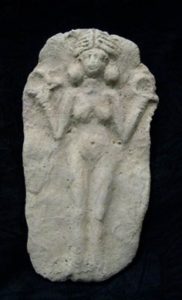(Texts: All Artifacts, Color Coding, & Writings in Bold Type With Italics Inside Parenthesis, are Added by Editor R. Brown, not the Authors, Translators, or Publishers!)
(gods in blue)
THE EXPLOITS OF NINURTA OR NINURTA LUGAL-E
“Ninurta, Enlil’s son, was handing down decisions.
At that moment the Lord’s battle-mace looked towards the Mountains,
the Car-ur (Ninurta’s weapon? /general?) cried out aloud to its master:
‘Lord of lofty station, foremost one,
who presides over all lords from the throne dais,
Ninurta, whose orders are unalterable,
whose decisions are faithfully executed; my master!
Heaven copulated with the verdant Earth,
Ninurta: she has born him a warrior who knows no fear —
the Asag (Marduk), a child who sucked the power of milk
without ever staying with a wet-nurse, a foster-child,
O my master — knowing no father, a murderer from the Mountains,
a youth who has come forth from ……,
whose face knows no shame; impudent of eye, an arrogant male,
Ninurta (1 ms. has instead: Ninjirsu), rejoicing in his stature.
My Hero, you who are like a bull, I will take my stand beside you.
My master, who turns sympathetically towards his own city,
who is effective in carrying out his mother’s wishes:
it has sired offspring in the Mountains, and spread its seeds far and wide.
The plants have unanimously named it king over them;
like a great wild bull, it tosses its horns amongst them.
The cu, the sajkal, the esi (diorite), the usium,
the kagina (haematite), and the heroic nu stones,
its warriors, constantly come raiding the cities.
For them a shark’s tooth has grown up in the Mountains; it has stripped the trees.
Before its might the gods of those cities bow towards it.
My master, this same creature has erected a throne dais: it is not lying idle.
Ninurta, Lord, it actually decides the Land’s lawsuits, just as you do.
Who can compass the Asag’s (Marduk’s) dread glory?
Who can counteract the severity of its frown?
People are terrified, fear makes the flesh creep; their eyes are fixed upon it.
My master, the Mountains have taken their offerings to it.”
“Hero! They have appealed to you, because of your father; son of Enlil,
Lord, because of your superior strength they are looking to you here;
since you are strong, my master,they are calling for your help,
saying, Ninurta, that not a single warrior counts except for you!
They wanted to advise you about …….
Hero, there have been consultations with a view to taking away your kingship.
Ninurta, it is confident that it can lay hands
on the powers received by you in the abzu (Enki’s domain).
Its face is deformed, its location is continually changing;
day by day, the Asag (Enki’s son Marduk) adds territories to its domain.”
“But you will force it into the shackles of the gods.
You, Antelope of Heaven, must trample the Mountains beneath your hooves,
Ninurta, Lord, son of Enlil.
Who has so far been able to resist its assault?
The besetting Asag is beyond all control, its weight is too heavy.
Rumors of its armies constantly arrive, before ever its soldiers are seen.
This thing’s strength is massive, no weapon has been able to overturn it.
Ninurta, neither the ax nor the all-powerful spear can penetrate its flesh,
no warrior like it has ever been created against you.
Lord, you who reach out towards the august divine powers (alien technology),
splendor, jewel of the gods, you bull with the features of a wild bull,
with a prominent backbone, …… this fellow is clever!
My Ninurta, whose form Enki contemplates with favor,
my Uta-ulu (Ninurta), Lord, son of Enlil, what is to be done?
The Lord cried “Alas!” so that Heaven trembled,
and Earth huddled at his feet and was terrified (?) at his strength.
Enlil became confused and went out of the E-kur.
The Mountains were devastated.
That day the earth became dark, the Anuna trembled.
The Hero beat his thighs with his fists. The gods dispersed;
the Anuna (Anunnaki) disappeared over the horizon like sheep.
The Lord arose, touching the sky;
Ninurta went to battle, with one step (?) he covered a league,
he was an alarming storm, and rode on the eight winds towards the rebel lands.
His arms grasped the lance.
The mace snarled at the Mountains, the club began to devour all the enemy.
He fitted the evil wind and the sirocco on a pole (?),
he placed the quiver on its hook (?).
An enormous hurricane, irresistible,
went before the Hero, stirred up the dust,
caused the dust to settle, leveled high and low, filled the holes.
It caused a rain of coals and flaming fires; the fire consumed men.
It overturned tall trees by their trunks, reducing the forests to heaps,
Earth put her hands on her heart and cried harrowingly;
the Tigris was muddied, disturbed, cloudy, stirred up.
He hurried to battle on the boat Ma-kar-nunta-eda;
the people there did not know where to turn, they bumped into (?) the walls.
The birds there tried to lift their heads to fly away,
but their wings trailed on the ground.
The storm flooded out the fish there in the subterranean waters,
their mouths snapped at the air.
It reduced the animals of the open country to firewood,
roasting them like locusts. (alien nuclear technology)
It was a deluge rising and disastrously ruining the Mountains.
The Hero Ninurta led the march through the rebel lands.
He killed their messengers in the Mountains, he crushed (?) their cities,
he smote their cowherds over the head like fluttering butterflies,
he tied together their hands with hirin grass,
so that they dashed their heads against walls.
The lights of the Mountains did not gleam in the distance any longer.
People gasped for breath (?); those people were ill,
they hugged themselves, they cursed the Earth,
they considered the day of the Asag’s birth a day of disaster.
The Lord caused bilious poison to run over the rebel lands.
As he went the gall followed, anger filled his heart,
and he rose like a river in spate and engulfed all the enemies.
In his heart he beamed at his lion-headed weapon,
as it flew up like a bird, trampling the Mountains for him. (skyship)
It raised itself on its wings to take away prisoner the disobedient,
it spun around the horizon of heaven to find out what was happening.
Someone from afar came to meet it,
brought news for the tireless one, the one who never rests,
whose wings bear the deluge, the Car-ur (terrible weapon).
What did it gather there …… for Lord Ninurta?
It reported the deliberations of the Mountains,
it explained their intentions to Lord Ninurta, it outlined (?)
what people were saying about the Asag.
“Hero, beware!” it said concernedly.
The weapon embraced him whom it loved,
the Car-ur (general / pilot / weapon) addressed Lord Ninurta:
“Hero, pitfall (?), net of battle,
Ninurta, King, celestial mace …… irresistible against the enemy,
vigorous one, tempest which rages against the rebel lands,
wave which submerges the harvest,
King, you have looked on battles, you have …… in the thick of them.
Ninurta, after gathering the enemy in a battle-net, after erecting a great reed-altar,
Lord, heavenly serpent, purify your pickaxe and your mace!
Ninurta, I will enumerate the names of the warriors you have already slain:
the Kuli-ana, the Dragon, Gypsum, the Strong Copper,
the hero Six-headed Wild Ram, the Magilum boat,
Lord Saman-ana, the Bison bull, the Palm-tree King,
the Anzud bird (Anzu), the Seven-headed Snake —
Ninurta, you slew them in the Mountains.”
“But Lord, do not venture again to a battle as terrible as that.
Do not lift your arm to the smiting of weapons,
to the festival of the young men, to Inanna’s dance!
Lord, do not go to such a great battle as this!
Do not hurry; fix your feet on the ground.
Ninurta, the Asag is waiting for you in the Mountains.
Hero who is so handsome in his crown, firstborn son (of Ninhursag)
whom Ninlil has decorated with numberless charms,
good Lord, whom a princess bore to an en priest,
Hero who wears horns like the moon, who is long life for the king of the Land,
who opens the sky by great sublime strength, inundation who engulfs the banks ……,
Ninurta, Lord, full of fearsomeness, who will hurry towards the Mountains,
proud Hero without fellow, this time you will not equal the Asag!
Ninurta, do not make your young men enter the Mountains.”
The Hero, the son, pride of his father,
the very wise, rising from profound deliberation,
Ninurta, the Lord, the son of Enlil, gifted with broad wisdom, the …… god,
the Lord stretched his leg to mount the onager, and joined the battalions …….
He spread over the Mountains his great long ……,
he caused …… to go out among its people like the …….
He reached …….
He went into the rebel lands in the vanguard of the battle.
He gave orders to his lance, and attached it …… by its cord;
the Lord commanded his mace, and it went to its belt.
The Hero hastened to the battle, he …… heaven and earth.
He prepared the throw-stick and the shield,
the Mountains were smitten and cringed beside the battle legions of Ninurta.
When the hero was girding on his mace, the sun did not wait, the moon went in;
they were forgotten, as he marched towards the Mountains;
the day became like pitch.
The Asag leapt up at the head of the battle.
For a club it uprooted the sky, took it in its hand;
like a snake it slid its head along the ground.
It was a mad dog attacking to kill the helpless, dripping with sweat on its flanks.
Like a wall collapsing, the Asag fell on Ninurta the son of Enlil.
Like an accursed storm, it howled in a raucous voice;
like a gigantic snake, it roared at the Land.
It dried up the waters of the Mountains, dragged away the tamarisks,
tore the flesh of the Earth and covered her with painful wounds.
It set fire to the reed-beds, bathed the sky in blood, turned it inside out;
it dispersed the people there.
At that moment, on that day, the fields became black potash,
across the whole extent of the horizon, reddish like purple dye —
truly it was so! (nuclear war, Ninurta & Nergal vrs. Marduk and Nabu)
An (Anu) was overwhelmed, crouched, wrung his hands against his stomach;
Enlil groaned and hid himself in a corner,
the Anuna flattened themselves against walls,
the house was full of fearful sighing as of pigeons.
The Great Mountain Enlil cried to Ninlil:
“My wife, my son is no longer here; what is there to support me?
The Lord, the authority of the E-kur,
the King who imposes the strong shackle for his father,
a cedar rooted in the abzu, a crown with broad shade,
my son, my security — he is not here any more: who will take me by the hand?”
The weapon which loved the Lord, obedient to its master,
the Car-ur .….. for Lord Ninurta to his father in Nibru …….
The awesome splendor enveloped Ninurta like a garment, …….
…… bound him: therefore the Lord …….
The weapon …… spoke to Enlil.
“…… Ninurta, having confidence in himself; …… he will be standing;
the waters will be dried up as if by the sun’s heat;
…… he will breathe again, he will be standing full of joy.
I shall cause horrid storms to rise against …… of the Hero Ninurta …….
…… as for him who resisted (?) the Mountains,
he has been amazed by his strength.
Now I shall give my orders, you are to follow these instructions:
1 line unclear
…… in the fields, let him not diminish the population.
…… let him not cause a lack of posterity.
Let him not cause to perish the name of all the kinds of species (alien weapons)
whose destinies I, Enlil, have decreed.”
The weapon, its heart ……, was reassured:
it slapped its thighs, the Car-ur began to run,it entered the rebel lands,
joyfully it reported the message to Lord Ninurta:
“My master, …… for you, Enlil has said:
“As the Deluge i.e. Ninurta, before whom the venom has piled up,
attacks the enemy, let him take the Asag by the shoulder,
let him pierce its liver, let my son enter with it into the E-kur.
Then, Ninurta, to the limits of the earth my people
will deservedly praise your power.”
You, Lord who trusts in the word of his father, do not tarry, great strength of Enlil.
Storm of the rebel lands, who grinds the Mountains like flour,
Ninurta, Enlil’s seal-bearer, go to it!
Do not tarry. My master:
the Asag has constructed a wall of stakes on an earthen rampart;
the fortress is too high and cannot be reached, …… its fierceness does not diminish.
3 lines unclear
My master, …….”
Ninurta opened his mouth to speak to the mace …….
He aimed the lance at the Mountains …….
The Lord stretched out an arm towards the clouds.
Day became a dark night.
He yelled like a storm, …….
2 lines unclear
The Lord …… clouds of dust.
In his battle he smote the Mountains with a cudgel.
The Car-ur made the storm-wind rise to heaven,
scattering the people; like …… it tore.
Its venom alone destroyed the townspeople.
The destructive mace set fire to the Mountains,
the murderous weapon smashed skulls with its painful teeth,
the club which tears out entrails gnashed its teeth.
The lance was stuck into the ground and the crevasses filled with blood.
In the rebel lands dogs licked it up like milk.
The enemy rose up, crying to wife and child,
“You did not lift your arms in prayer to Lord Ninurta“.
The weapon (alien technology) covered the Mountains with dust,
but did not shake the heart of the Asag.
The Car-ur threw its arms around the neck of the Lord:
“Hero, ah, what further awaits you?
Do not on any account meddle with the hurricane of the Mountains.
Ninurta, Lord, son of Enlil, I tell you again, it is made like a storm.
It is a blister whose smell is foul,
like mucus which comes from the nose it is unpleasant,
Lord, its words are devious, it will not obey you.
My master, it has been created against you as a god; who can help you?
Hero, it falls on the land as a whirlwind, it scrubs it as if with saltwort,
Ninurta, it chases the onagers before it in the Mountains.
Its terrifying splendor sends the dust into clouds,
it causes a downpour of potsherds (alien nuclear technology).
In the rebel lands it is a lion striking with savage teeth; no man can catch it.
After reducing everything to nothing in the north wind, it …….
The sheepfolds have been closed by ghostly demons.
It has dried up the waters in the ground.
In the whirlwind storm, the people are finished, they have no solution (?).
From an implacable enemy, great Hero, Lord, turn away,” he said quietly.
But the Lord howled at the Mountains, could not withhold a roar.
The Hero did not address the rebel lands, he …….
He reversed the evil that it had done …….
He smashed the heads of all the enemies, he made the Mountains weep.
The Lord ranged about in all directions,
like a soldier saying “I will go on the rampage”.
Like a bird of prey the Asag looked up angrily from the Mountains.
He commanded the rebel lands to be silent and …….
Ninurta approached the enemy and flattened him like a wave (?).
The Asag’s terrifying splendor was contained, it began to fade, it began to fade.
It looked wonderingly upwards.
Like water he agitated it, he scattered it into the Mountains,
like weeds he pulled it up, like rushes he ripped it up. …”
ERRA (Nergal) AND ISHUM (Ninurta)
TABLET I
Narrator invokes Marduk, chief deity of Babylon, and Ishum (Ninurta), vanguard and companion of Erra (Nergal). Erra is restless and breaks into a soliloquy. He is anxious to fight and campaign, but hesitates through natural inertia.
Speaking of himself in the third person, Erra says that what he needs to stir him to action is Ishum´s encouragement (Ninurta & Nergal Battle Marduk)
“O Ishum (Ninurta), zealous slaughterer,
whose hands are suited to brandish fierce weapons,
And to make his sharp spear flash, Erra (Nergal), warrior of the gods,
was restless in his dwelling,
His heart urged him to do battle!
Says he to his weapons.
“Smear yourselves with deadly venom!”
To the Seven, warriors (alien technology-nuclear weapons) unrivaled,
“Let your weapons be girded!”
He even says to you:
“You are the torch, they will see your light
“You are the vanguard, the gods will [ ]
“You are the stanchion, [zealous] slaughterer!
“(So) up, Erra, from laying waste the land
“How cheerful your mood will be and joyful your heart!
“Erra´s limbs are sluggish, like those of a mortal lacking sleep,
“He says to himself, ‘Shall I get up or go to sleep?’
“He says to his weapons, ‘Stay in the corners!’
“To the Seven, warriors unrivaled,
‘Go back to your dwellings!’
“Until you rouse him, he will sleep in his bedrooms,
“He will dally with Mami, his mate”.
(With a second invocation, now of Ishum, the narrator introduces the terrible Seven (nuclear weapons), who stand ready to massacre the “black-headed folk” or Mesopotamians) (plus Marduk and Nabu)
O Engidudu, (?) who patrols at night, ever guiding the noble,
Who ever guides young men and women in safety, making light as day,
The Seven, warriors (the 7 nuclear missiles) unrivaled,
their divine nature is different,
Their origins are strange, (alien technology from Nibiru) they are terrifying,
Whoever sees them is numbed with fear.
Their breath of life is death,
People are too frightened to approach it!
Yet Ishum is the door, bolted before them.
When Anu, the king of the gods, sowed his seed in the earth,
She bore him seven gods (7 missiles), he called them the Seven.
They stood before him, that he ordain their destinies,
He summoned the first to give his instructions,
“Wherever you go and spread terror, have no equal.”
He said to the second,
“Burn like fire, scorch like flame”.
He commanded the third,
“Look like a lion, let him who sees you be paralyzed with fear”.
He said to the fourth,
“Let a mountain collapse when you present your fierce arms”.
He said to the fifth,
“Blast like the wind, scan the circumference of the earth”.
He said to the sixth.
“Go out everywhere (like the deluge) and spare no one”.
The seventh he charged with viperous venom,
” Slay whatever lives”.
After Anu had ordained destinies for all of the Seven (nuclear missiles),
He gave those very ones to Erra, warrior of the gods, saying:
“Let them go beside you,
when the clamor of human habitations becomes noisome to you,
“And you resolve to wreak destruction,
“To massacre the black-headed folk and fell the livestock,
“Let these be your fierce weaponry, let them go beside you”.
The Seven offer the encouragement that Erra needs. . In a rousing call to arms, they extol the heroic excitement of the campaign, the honor, prestige and gratification it brings. The Seven claim vaguely that they are not respected enough, that others are growing more important than they. They bring up the old charge that men make too much noise for the gods to sleep, although this was not the cause Erra had given for his own lack of sleep. The Seven claim further that there are too many wild animals on the loose. Their final claim no doubt the most important one, is that they are bored and out of training. (for war against Marduk & Nabu!)
These are the ones who are in a fury, holding their weapons aloft,
They are saying to Erra, “Up, do your duty!
“Why have you been sitting in the city like a feeble old man,
“Why sitting at home like a helpless child?
“Shall we eat woman food, like non-combatants?
Have we turned timorous and trembling, as if we can’t fight?
“Going to the field for the young and vigorous is like to a very feast,
“But the noble who stays in the city can never eat enough.
“His people will hold him in low esteem, he will command no respect,
“How could he threaten a campaigner?
“However well developed is the strength of the city dweller,
“How could he possibly best a campaigner?
“However toothsome city bread, it holds nothing to the campfire loaf,
“However sweet fine beer, it holds nothing to water from a skin,
“The terraced palace holds nothing to the wayside sleeping spot!
“Be off to the field, warrior Erra, make your weapons clatter,
“Make loud your battle cry that all around they quake,
“Let the Igigi-gods (those who transport to & from Nibiru & Earth)
hear and extol your name,
“Let the Anunna-gods hear and flinch at the mention of your,
“Let all the gods hear and bend for your yoke,
“Let sovereigns hear and fall prostrate before you,
“Let countries hear and bring you their tribute,
“Let the lowly hear and perish of their own accord,
“Let the mighty hear and his strength diminish,
“Let lofty mountains hear and their peaks crumble,
“Let the surging sea hear and convulse, wiping out her increase!
“Let the stalk be yanked from the tough thicket,
“Let reeds of the impenetrable morass be shorn off,
“Let men turn cowards and their clamor subside,
“Let beasts tremble and return to clay,
“Let the gods your ancestors see and praise your valor!
“Warrior Erra, why do you neglect the field for the city?
“The very beats and creatures hold us in contempt!
“O warrior Erra, we will tell you, thought that we say be offensive to you!
“Erra the whole land outgrows us,
“You must surely hear our words!
“Do a kindly deed for the gods of hell, who delight in deadly stillness,
“The Anunna-gods (those on Earth doing the work)
cannot fall asleep for the clamor of humankind,
Beasts are overrunning the meadows, life of the land,
“The farmer sobs bitterly for his field,
“Lion and wolf are felling the livestock,
“The shepherd, who cannot sleep day and night
for the sake of his flocks, is calling upon you,
“We too, who know the mountain passes, have forgotten how to go,
“Cobwebs are spun over our field gear,
“Our fine bow resists and is too strong for us,
“The tip of our sharp arrow is bent out of true,
“Our blade is corroded for want of a slaughter!”
The warrior Erra heard them,
What the Seven said pleased him like finest oil.
He made ready to speak and said to Ishum:
“Why, having heard, did you sit by silent?
“Lead the way, let me begin my campaign!
“[ ] the Seven, warriors without rival,
Make my fierce weapons (the Seven) march by my side,
But you be the vanguard and rear guard”.
When Ishum heard what he said, he felt pity and said to the warrior Erra:
“O Lord Erra, why have you plotted evil against the gods?
“To lay waste the lands and decimate the people”.
Erra made ready to speak and said to Ishum (Ninurta), his vanguard:
“Keep quiet, Ishum, listen to what I say,
as concerns the people of the inhabited world, whom you would spare.
“O vanguard of the gods, wise Ishum, whose counsel is always for the best,
“I am the wild bull in heaven, I am the lion on earth,
“I am king in the land, I am the fiercest among the gods,
“I am warrior among the Igigi-gods, mighty one among the Anunna-gods!
“I am the smiter of wild beasts, battering ram against the mountain,
“I am the blaze in the reed thicket, the broad blade against the rushes,
“I am banner for the march, I blast like the wind, I thunder like the storm,
“Like the sun, I scan the circumference of the world,
“I am the wild ram striding forth in the steppe,
“I invade the range and take up my dwelling in the fold,
“All the gods are afraid of a fight, so the black-headed folk are contemptuous!
“As for me, since they did not fear my name,
and I have disregarded Marduk´s command,
so he may act according to his wishes”I will make Marduk angry,
stir him from his dwelling, and lay waste the people!”
The warrior Erra (Nergal) set out for Babylon, city of the king of the gods.
He entered Esagila (Marduk’s), palace of heaven and earth
and stood before him. …
When Marduk heard this, he made ready to speak, saying to the warrior Erra:
“(When) I rise from my dwelling,
the regulation of heaven and earth will disintegrate,
“The waters will rise and sweep over the land,
“Bright day will turn to darkness,
whirlwind will rise and the stars of heaven will be…
“Ill winds will blow and the eyesight of living creatures will be darkened,
“Demons will raise up and seize [ ],
“They will …. the unarmed one who confronts them!
“The gods of hell will rise up and smite down living creatures,
“Who will keep them at bay till I gird on my weaponry once more?
When Erra heard this, he made himself ready to speak, saying to noble Marduk:
“O noble Marduk, while you enter the house,
fire cleanses your apparel and you return to your palace,
“For that time I will govern and keep strong the regulation of heaven and earth,
“I will go up to heaven and issue instructions
to the Igigi (gods in orbit under Marduk, to transport goods) gods,
“I will go down to the depths and keep the Anunna (Anunnaki) gods in order.
“I will dispatch the wild demons to the netherworld,
“I will brandish my fierce weaponry against them,
“I will truss the wings of the ill wind like a bird’s.
“At that house you shall enter, O noble Marduk,
“I will station Anu and Enlil to the right and left, like bulls.”
Noble Marduk heard him, the words which Erra spoke pleased him.
TABLET II
He arose from his dwelling, an inaccessible place,
He set out for the dwelling of the Anunna-gods.
He entered that house and stood before them.
Shamash (Utu) looked upon him and let his protective radiance fall…
Sin (Sin / Nannar) looked everywhere, and did not leave the Netherworld,
Ill winds rose and the bright daylight was turned to gloom,
The clamor of the peoples throughout the land was stilled,
The Igigi gods were terrified and went up to heaven,
The Anunna gods were frightened and went down to the pit of hell,
[ ] the entire circumference [ ][ ] in the dust …”
The lament for Urim: translation
entire text
LAMENTATION FOR THE DESTRUCTION OF UR
entire text
LAMENT FOR SUMER AND URIM
entire text
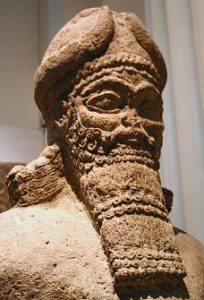
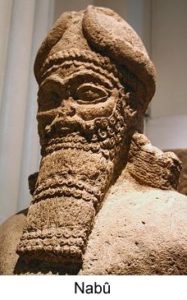 (Nabu, Marduk’s son, patron god over Borsippa)
(Nabu, Marduk’s son, patron god over Borsippa) 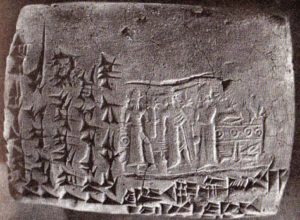 (Marduk, spouse Sarpanit, & son Nabu)
(Marduk, spouse Sarpanit, & son Nabu) 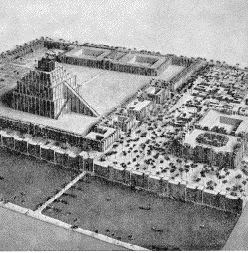 (Marduk’s ziggurat residence separated from his city of Babylon)
(Marduk’s ziggurat residence separated from his city of Babylon) 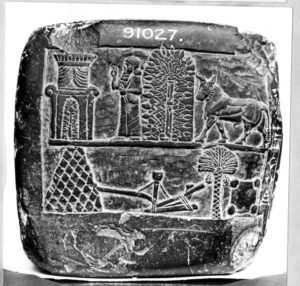 (Marduk’s temple residence, & King Esarhaddon giving praise)
(Marduk’s temple residence, & King Esarhaddon giving praise) 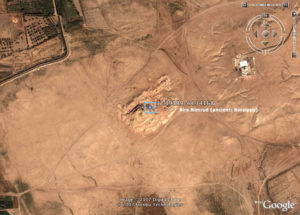
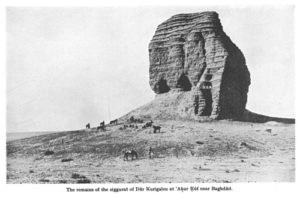
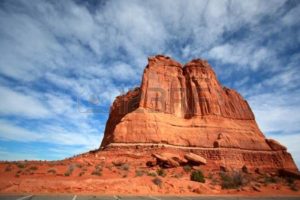
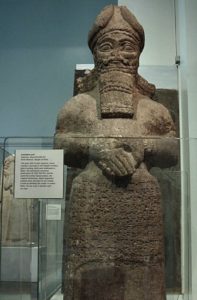
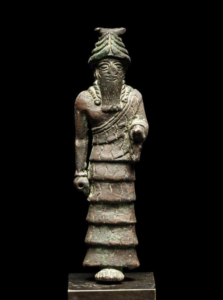
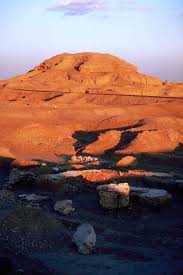
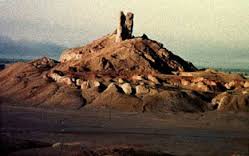
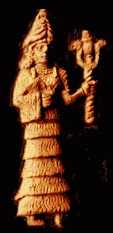
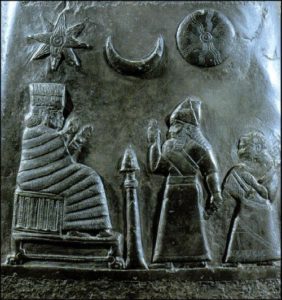 (
(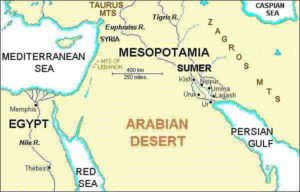
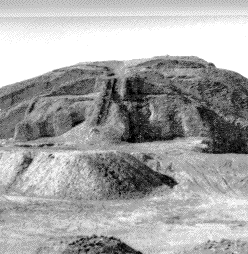
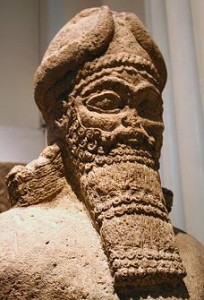
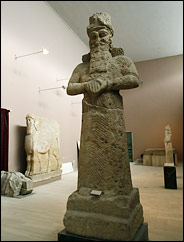
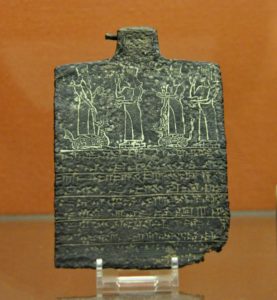
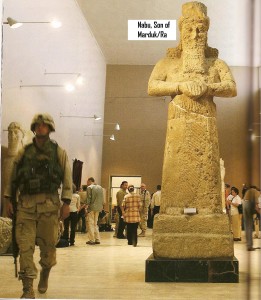

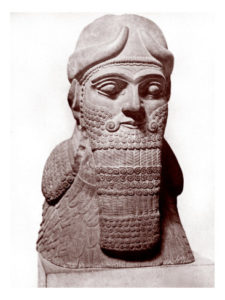
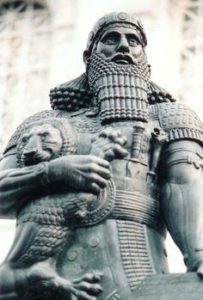
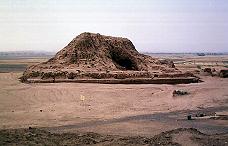
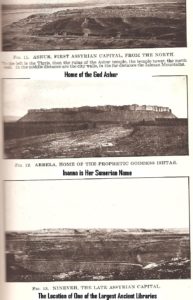 (
(